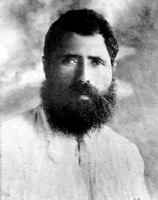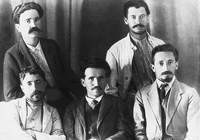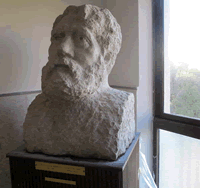Yosef Haim Brenner
https://yhbrener.wordpress.com/brener/?fbclid=IwAR1y2gA3iWWbrSVeUF0mEWQP1kVE7oBZgTRCe2IYLjBz9jyGTDM2Vw5Oz7c

(also Yosef Chaim Brenner, 11 September 1881–2 May 1921) was a Russian-born Hebrew-language author and one of the pioneers of modern Hebrew literature.
Biography

Right to left; seated – Yitzhak Ben-Zvi, David Ben-Gurion, Yosef Haim Brenner; standing – A. Reuveni, Ya'akov Zerubavel (1912)
Yosef Haim Brenner was born to a poor Jewish family in Novi Mlini, Russian Empire. He studied at a yeshiva in Pochep, and published his first story, Pat Lechem ("A Loaf of Bread") in HaMelitz, a Hebrew language newspaper, in 1900, followed by a collection of short stories in 1901.[1]
In 1902, Brenner was drafted into the Russian army. Two years later, when the Russo-Japanese War broke out, he deserted. He was initially captured, but escaped to London with the help of the General Jewish Labor Bund, which he had joined as a youth.
In 1905, he met the Yiddish writer Lamed Shapiro. Brenner lived in an apartment in Whitechapel, which doubled as an office for HaMe'orer, a Hebrew periodical that he edited and published in 1906–07. In 1922, Asher Beilin published Brenner in London about this period in Brenner's life.
Brenner married Chaya, with whom he had a son, Uri.[2]
Brenner immigrated to Palestine (then part of the Ottoman Empire) in 1909. He worked as a farmer, eager to put his Zionist ideology into practice. Unlike A. D. Gordon, however, he could not take the strain of manual labor, and soon left to devote himself to literature and teaching at the Gymnasia Herzliya in Tel Aviv. According to biographer Anita Shapira, he suffered from depression and problems of sexual identity.[2] He was murdered in Jaffa on May 1921 during the Jaffa riots.
Zionist views
In his writing, Brenner praised the Zionist endeavor, but also contradicted himself, contending that the Land of Israel was just another diaspora and no different from other diasporas.[2]
Writing style

Bust of Yosef Haim Brenner,by Israeli sculptress Batya Lichansky
Brenner was very much an "experimental" writer, both in his use of language and in literary form. With Modern Hebrew still in its infancy, Brenner improvised with an intriguing mixture of Hebrew, Aramaic, Yiddish, English and Arabic. In his attempt to portray life realistically, his work is full of emotive punctuation and ellipses. Robert Alter, in the collection Modern Hebrew Literature, writes that Brenner "had little patience for the aesthetic dimension of imaginative fictions: 'A single particle of truth,' he once said, 'is more valuable to me than all possible poetry.'" Brenner "wants the brutally depressing facts to speak for themselves, without any authorial intervention or literary heightening."[3] This was Alter's preface to Brenner's story, "The Way Out", published in 1919, and set during Turkish and British struggles over Palestine in WWI.
Commemoration
The site of his murder is now marked by Brenner House, a center for Hanoar Haoved Vehalomed, the youth organization of the Histadrut. Kibbutz Givat Brenner was also named for him, while kibbutz Revivim was named in honour of his magazine. The Brenner Prize, one of Israel's top literary awards, is named for him.[4]
Published works
• In Winter (novel), Hashiloah, 1904 [Ba-Horef]
• Around the Point (novel), Hashiloah, 1904 [Misaviv La-Nekudah]
• Min Hametzar (novel), 1908
• Nerves (novella), Shalekhet, 1910 [Atzabim]
? English: In Eight Great Hebrew Short Novels, New York, New American Library, 1983
? Spanish: In Ocho Obras Maestras de la Narrativa Hebrea, Barcelona, Riopiedras, 1989
? French: Paris, Intertextes, 1989; Paris, Noel Blandin, 1991
• From Here and There (novel), Sifrut, 1911 [Mi-Kan U-Mi-Kan]
• Breakdown and Bereavement (novel), Shtiebel, 1920 [Shchol Ve-Kishalon]
? English: London, Cornell Univ. Press, 1971; Philadelphia, JPS, 1971; London, The Toby Press,[5] 2004
? Chinese: Hefei, Anhui Literature and Art Publishing House, 1998
• Collected Works (four volumes), Hakibbutz Hameuchad, 1978–1985 [Ketavim]
• Out of the Depths or "Out Of A Gloomy Valley", Brenner's first book is a collection of 6 short stories about Jewish life in the diaspora. It was published in Warsaw 1900.
? English: Colorado, Westview Press, 1992
• Around the Point
? Yiddish: Berlin, Yiddisher Literarisher Ferlag, 1923
• In the Winter
? Yiddish: Warsaw, Literarisher Bleter, 1936
See also[edit]
• Hebrew literature
References
1 ^ "Yosef Hayyim Brenner," Encyclopaedia Judaica, 1972, vol. 4, p. 1347
2 ^ Jump up to:a b c Golan, Avirama (2008-09-18). "The case of y.h. brenner". Haaretz. Retrieved 2018-05-22.
3 ^ Alter, Robert (1975). Modern Hebrew Literature. New York: Berhman House. p. 141.
4 ^ "Hebrew Writers Association, Brenner Prize". Hebrew-writers.org. Retrieved 2013-12-16.
5 ^ "Breakdown and Bereavement by Y.H. Brenner". The Toby Press. Archived from the original on July 17, 2012. Retrieved 2013-12-16.
Further reading
• Antony Berris. Stanford. California: Stanford University Press.
• Yosef Haim Brenner: A Biography (Brenner: Sippur hayim), Anita Shapira, Am Oved (in Hebrew)
• Yosef Haim Brenner: Background, David Patterson, Ariel: A Quarterly Review of Arts and Letters in Israel, vol. 33/34, 1973
External links
• Brenner's Hebrew works in Project Ben-Yehuda
• Institute for Translation of Hebrew Literature bio
• Works by or about Yosef Haim Brenner at Internet Archive
• Works by Yosef Haim Brenner at LibriVox (public domain audiobooks)